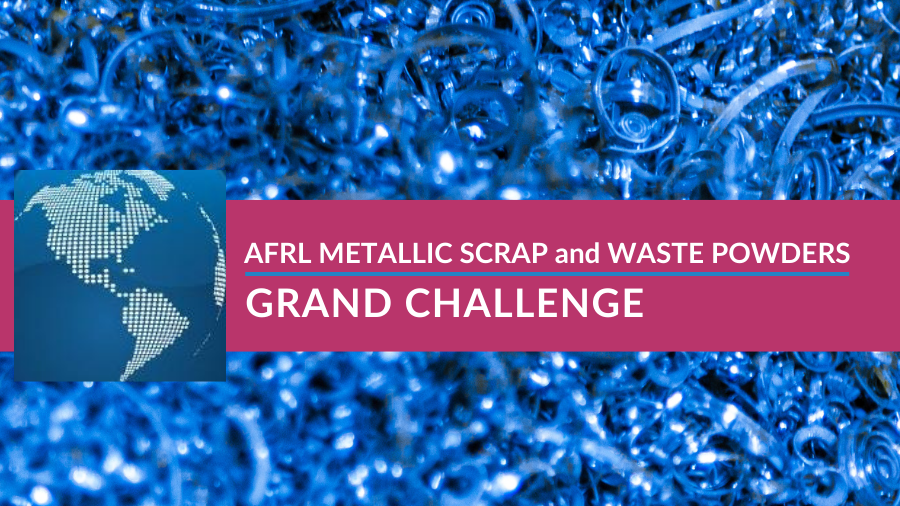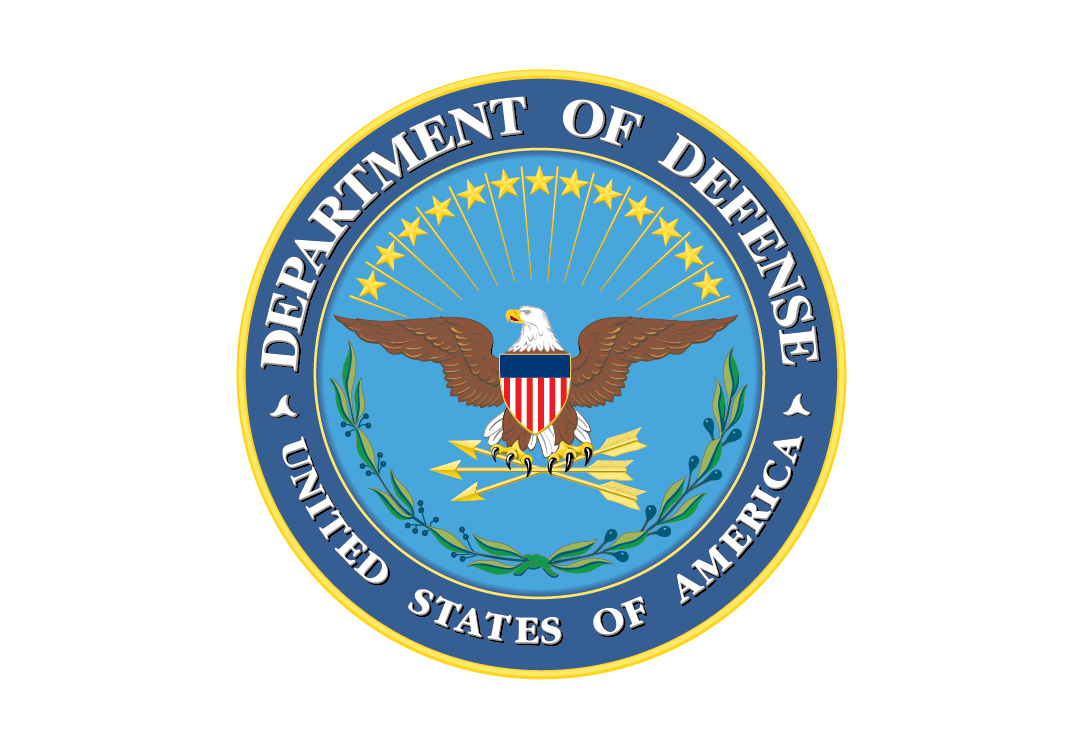
NSIN Presents: Air Force Research Laboratory Grand Challenge #4

Grand Challenge Overview
The Air Force Research Laboratory (AFRL) is seeking white papers to identify a cheaper process than re-processing of waste titanium alloy Ti-6Al-4V and other aerospace-relevant titanium alloys from two or more from: 1) failed additive builds, 2) used or expired powder, 3) broken parts or 4) machining scrap. The winner of this Grand Challenge is eligible for a contract award up to $500,000.
Specifically, AFRL is seeking white papers to identify a process to recycle waste titanium alloy Ti-6Al-4V at a cost lower than virgin powder. It is expected that the Solver will be able to complete Phase II in 2.5 months, Phase III in 2.5 months and Phase IV in 5 months for a total duration of 10 months from start. The specific time frames for each phase are negotiable; however, all deliverables must be completed within 10 months from the start date. If participants do not think they can accomplish this in that time frame, they should state that in their white paper.
The Challenge
Additive Manufacturing (AM) of metallic components is becoming increasingly common in industry for the production of novel and complex geometry parts. In the past decade, significant investments have been made in powder production, machine development, and best practices to mature relevant technologies such that airworthy components may be reliably printed. As the USAF and the rest of the DoD look to the future of manufacturing, it is becoming more apparent that additive manufacturing must play a role. Researchers at AFRL Materials and Manufacturing Directorate, the Munitions Directorate, and the Air Vehicles Directorate support this approach and realize that hypersonic systems are critical to meeting Secretary of the Air Force Frank Kendall’s imperative “Achieving Moving Target Engagement at Scale in a Challenging Operational Environment” by being effective against targets of interest and survivable. These advanced systems will benefit from the ability to print large quantities of complex parts from material that can be very costly. Because of this, it is essential that costs be reduced wherever possible to bring sufficient mass to the fight.
This Grand Challenge concerns the reconditioning of metallic powder and metallic scrap into powder suitable for AM. Metals critical to future aerospace applications include Ti-6Al-4V and other aerospace-relevant titanium alloys since acquisition of raw ores is economically and logistically prohibitive.
During Laser Powder Bed Fusion (LPBF) additive manufacturing (AM), only 20-40% of powder used during a build cycle ends up in fabricated parts. Powder not directly melted is recycled to be used again. However, powder can only be reused so many times before it is considered out of specification due to changes in powder sphericity (which affects flowability and spreadability), powder size distribution, and/or elevated contaminant levels. Powders of interest can cost as much as $250/lb., so achieving maximum reuse is essential. Use of inappropriate powder increases the probability of defects and thus jeopardizes the structural integrity of AM components, especially if they are load bearing.
In a similar vein, scrap material such as failed additive builds and chips from machining or other subtractive processes are abundant and constitute a significant amount of industrial metallic waste. Currently, out of specification powders and scrap material are completely re-processed into either billets or new lower-grade powders.
Grand Challenge Details
- What: AFRL Reprocessing of Metallic Scrap and Waste Powders Grand Challenge
- When: Oct. 17, 2022 - Nov. 8, 2022, submission due at 4:00 p.m. (ET)
- Where: Virtual
- Who: Eligibility for this challenge competition is limited to U.S. citizens.
- Why: Problem solvers in the field of titanium metallurgy and metal powder manufacturing can win a contract up to $500,000, awarded across four phases, to demonstrate production of powder from scrap materials and rejuvenation of used or out-of-spec titanium powder for additive manufacturing.
Learn More - Question and Answer Session | November 7, 2022
Join us on Monday, November 7, 2022, at 10:00 a.m. ET for a Question and Answer session regarding this Challenge Opportunity about the Reprocessing of Metallic Scrap and Waste Powders Grand Challenge.
Registration for this event has now closed.
Phases & Deliverables
It is expected that the Solver will be able to complete Phase II in 2.5 months, Phase III in 2.5 months and Phase IV in 5 months for a total duration of 10 months from start. The specific time frames for each phase are negotiable; however, all deliverables must be completed within 10 months from the start date. If participants do not think they can accomplish this in that time frame, they should state that in their white paper.
Phase I: White Paper Submission and Pitch Day
- In the first phase of this competition, participants will submit a white paper describing their approach to reprocess scrap and waste material. The white paper should also describe if and how the material will be decontaminated using their process to bring it into a precursor state that is within the acceptable margin of contamination. This can be in any form including, but not limited to, bar, wire, or powder. The white paper should have an analysis of estimated cost per pound required to get to this form. The winning team of this Pitch Competition will be awarded 25% of the total contract award value and move to Phase II. Specific instructions regarding the contents of the pitch will be provided with the invitation to pitch.
- Administrative requirements for the white paper are provided on the Solution Submission Form.
Phase II: Generation of a Precursor Feedstock
- The team will demonstrate part of their approach by producing a precursor feedstock from scrap and/or recycled or used powder (samples can be provided by AFRL). A precursor feedstock can generally be described as the physical form the material needs to be in for the subsequent atomization process. Forms include, but are not limited to, rod, sheet, non-spherical powder, and wire. The team will provide samples of this precursor form for testing by AFRL, and an internal or external assessment of the material composition, including contaminants. Upon approval by AFRL that precursor form is acceptable, the team will be awarded another 25% of the total contract award value and move to Phase III. If the performer believes that a precursor form is not necessary for powder production from scrap materials, Phases II and III can be combined.
Phase III: Powder Production
- The team will then demonstrate how to turn the precursor form into spherical powder with a relevant size distribution and contamination level for use in metal 3D printers. Samples of this reconstituted powder will be sent to AFRL for testing and characterization. The team will also provide an internal or external quality assessment of the produced powder. Upon approval of AFRL that this will work, the team will be provided 45% of the total contract award value and move to Phase IV.
Phase IV: Build, Test, and Analyze Cost Savings for the Overall Concept
- The team will build out a functional system and test the system for functionality and repeatability. The system will demonstrate the ability to take scrap material and turn it into recycled alloy powder for metal 3D printers. The team will provide a demonstration of the system to AFRL and produce a final report on the results including a projected cost for recycling material (can be estimated for scale-up production if that will reduce overall cost), total contamination and size distribution/range of the produced powder. Assumptions on minimum amount needed to achieve cost reduction can be included. Upon successful demonstration of the system and receipt of the final report, the team will receive the final 5% of the contract award value.
Project Deliverables
- Samples of the precursor form for AFRL testing from phase II
- Samples of reconstituted powder for AFRL characterization from phase III
- Final report from Phase IV
- Demonstration of the functional system to the AFRL team from Phase IV
- Demonstration of repeatability for phase IV. Should manufacture and deliver at least 10kg of powder from at least 5 repeatability trials.
Contract Award Distribution
Submissions will be evaluated on the concept’s ability to meet the requirements delineated under “The Solution.” If the Seeker does not deem any submission viable to get to testable solutions, then no winner will be selected.
The Seeker will award the winner 25% of the total contract award value (up to $125K) upon selection, 25% of the total contract award value (up to $125K) upon successful completion of Phase II, 45% (up to $225K) of the total contract award value upon successful completion of Phase III, and the final 5% (up to $25K) upon successful completion of Phase IV. If it is determined upon AFRL evaluation that the results of Phase II or III are insufficient, then the program shall be terminated and no additional money will be awarded.
Access Grand Challenge #4
To participate in the challenge, teams will need to create an account on IdeaScale. Upon registration teams will receive a verification email. Check your spam folder if the verification email is not received. Please contact challenges@nsin.mil for questions about IdeaScale registration. All relevant information regarding this Challenge can be found via the following link to the IdeaScale platform:
Partners
***Distribution A. Approved for public release: distribution unlimited. Case Number: AFRL-2022-3547
